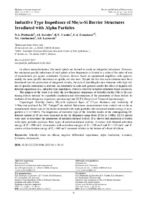Inductive Type Impedance of Mo/n-Si Barrier Structures Irradiated with Alpha Particles

Authors
Date
2023Publisher
Another Title
Импеданс индуктивного типа барьерных структур Mo/n-Si, облучённых альфа-частицами
Bibliographic entry
Inductive Type Impedance of Mo/n-Si Barrier Structures Irradiated with Alpha Particles = Импеданс индуктивного типа барьерных структур Mo/n-Si, облучённых альфа-частицами / N. A. Poklonski [et al.] // Приборы и методы измерений. – 2023. – Т. 14, № 1. – С. 38-43.
Abstract
In silicon microelectronics, flat metal spirals are formed to create an integrated inductance. However, the maximum specific inductance of such spirals at low frequencies is limited to a value of the order of tens of microhenries per square centimeter. Gyrators, devices based on operational amplifiers with approximately the same specific inductance as spirals, are also used. Despite the fact that such solutions have been introduced into the production of integrated circuits, the task of searching for new elements with high values of specific inductance is relevant. An alternative to coils and gyrators can be the effect of negative differential capacitance (i.e., inductive type impedance), which is observed in barrier structures based on silicon. The purpose of the work is to study the low-frequency impedance of Schottky diodes (Mo/n-Si) containing defects induced by α-particles irradiation and determination of the parameters of these defects by methods of low-frequency impedance spectroscopy and DLTS (Deep Level Transient Spectroscopy). Unpackaged Schottky diodes Mo/n-Si (epitaxial layer of 5.5 μm thickness and resistivity of 1 Ohm∙cm) produced by JSC “Integral” are studied. Inductance measurements were carried out on the as manufactured diodes and on the diodes irradiated with alpha particles (the maximum kinetic energy of an α- particle is 5.147 MeV). The impedance of inductive type of the Schottky diodes at the corresponding DC forward current of 10 μA were measured in the AC frequency range from 20 Hz to 2 MHz. DLTS spectra were used to determine the parameters of radiation-induced defects. It is shown that irradiation of diodes with alpha particles produces three types of radiation-induced defects: A-centers with thermal activation energy of E1 ≈ 190 meV, divacancies with activation energies of E2 ≈ 230 meV and E3 ≈ 410 meV, and Ecenters with activation energy of E4 ≈ 440 meV measured relative to the bottom of c-band of silicon.
Abstract in another language
В кремниевой микроэлектронике для создания интегральной индуктивности формируют плоские металлические спирали. Однако максимальная удельная индуктивность таких спиралей на низких частотах ограничена значением порядка десятков микрогенри на квадратный сантиметр. Используются также гираторы – устройства на основе операционных усилителей, примерно с такой же удельной индуктивностью, как и спирали. Несмотря на то, что такие решения внедрены в производство интегральных микросхем, актуальной является задача поиска новых элементов с большими значениями удельной индуктивности. Альтернативой спиралям и гираторам может стать эффект отрицательной дифференциальной ёмкости (т. е. импеданса индуктивного типа), наблюдаемый в барьерных структурах на кремнии. Цель работы – исследование низкочастотного импеданса диодов Шоттки (Mo/n-Si), содержащих радиационные дефекты, создаваемые α-частицами, и определение параметров этих дефектов методами низкочастотной импедансной спектроскопии и спектроскопии DLTS (Deep Level Transient Spectroscopy). Исследованы бескорпусные диоды Шоттки 5.5КЭФ-1 (Mo/n-Si) производства ОАО «Интеграл». Измерения индуктивности проводились на исходных диодах и на диодах, облучённых альфа-частицами (максимальная кинетическая энергия α-частицы 5.147 МэВ). В интервале частот переменного тока от 20 Гц до 2 МГц измерен импеданс индуктивного типа диодов при постоянном прямом токе 10 мкА. Для определения параметров радиационных дефектов измерялись спектры DLTS. Показано, что при облучении диодов Шоттки альфа-частицами образуется три типа радиационных дефектов: A-центры с энергией термической активации E1 ≈ 190 мэВ, дивакансии с энергиями активации E2 ≈ 230 мэВ и E3 ≈ 410 мэВ и E-центры с энергией активации E4 ≈ 440 мэВ, отсчитанные от дна cзоны кремния.
View/
Collections
- Т. 14, № 1[7]
